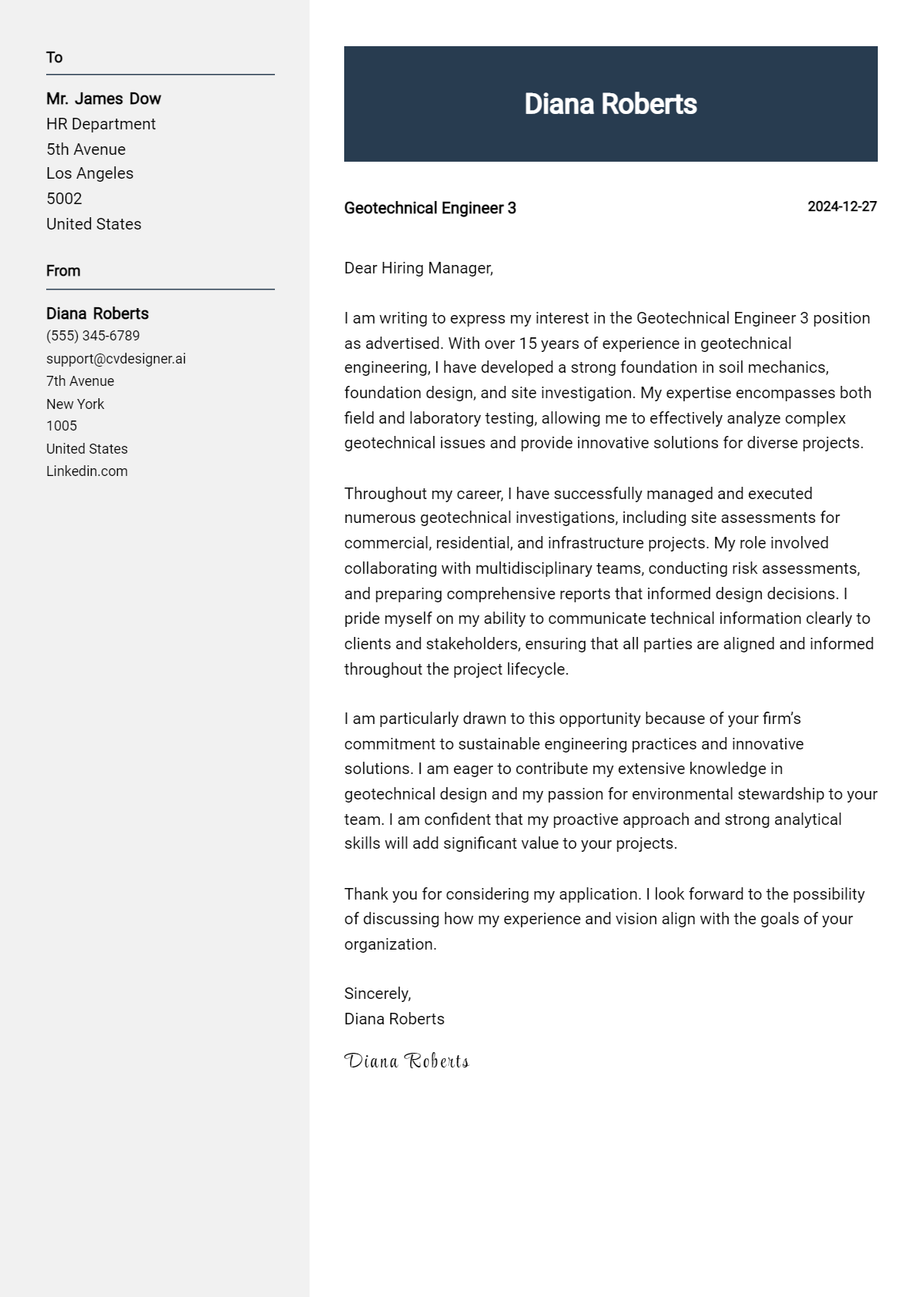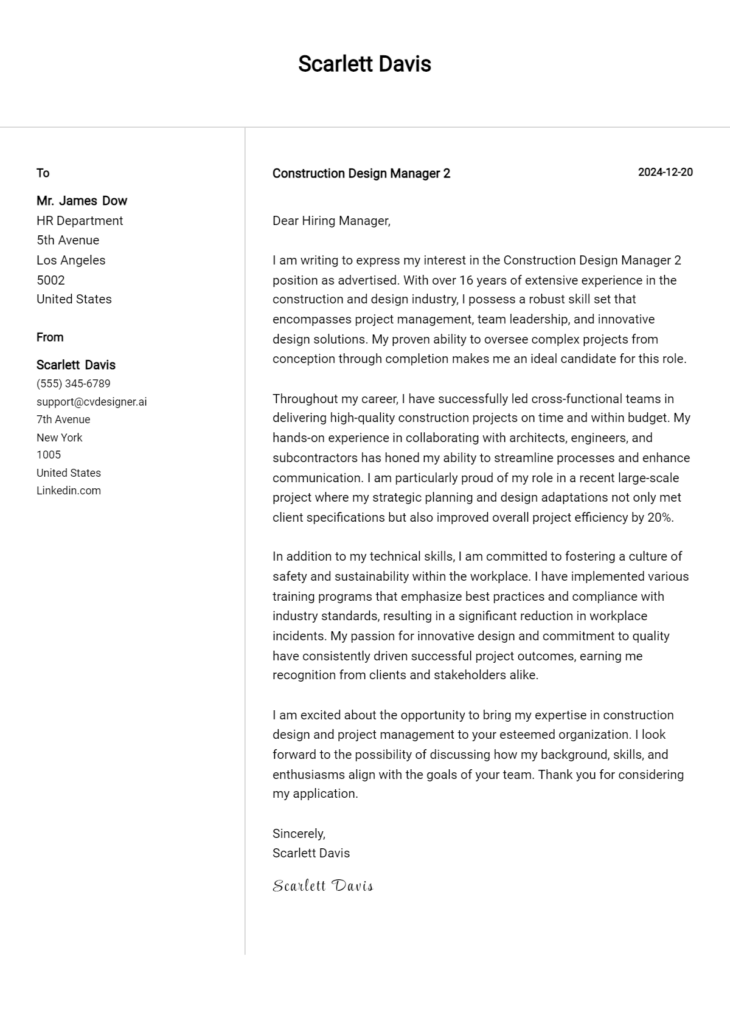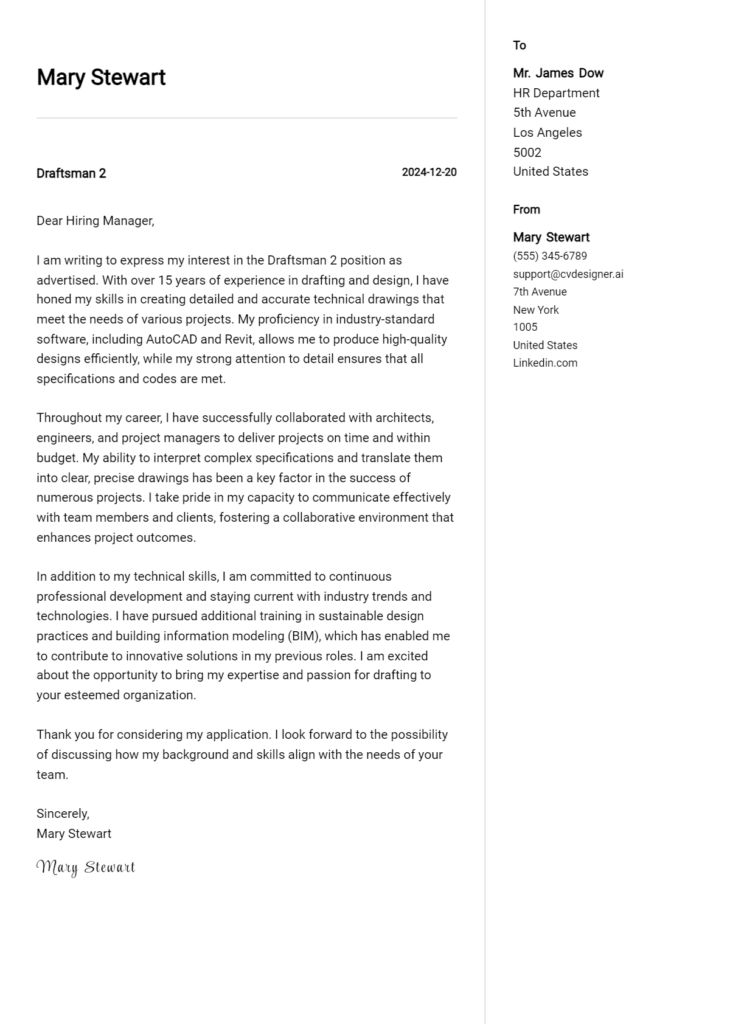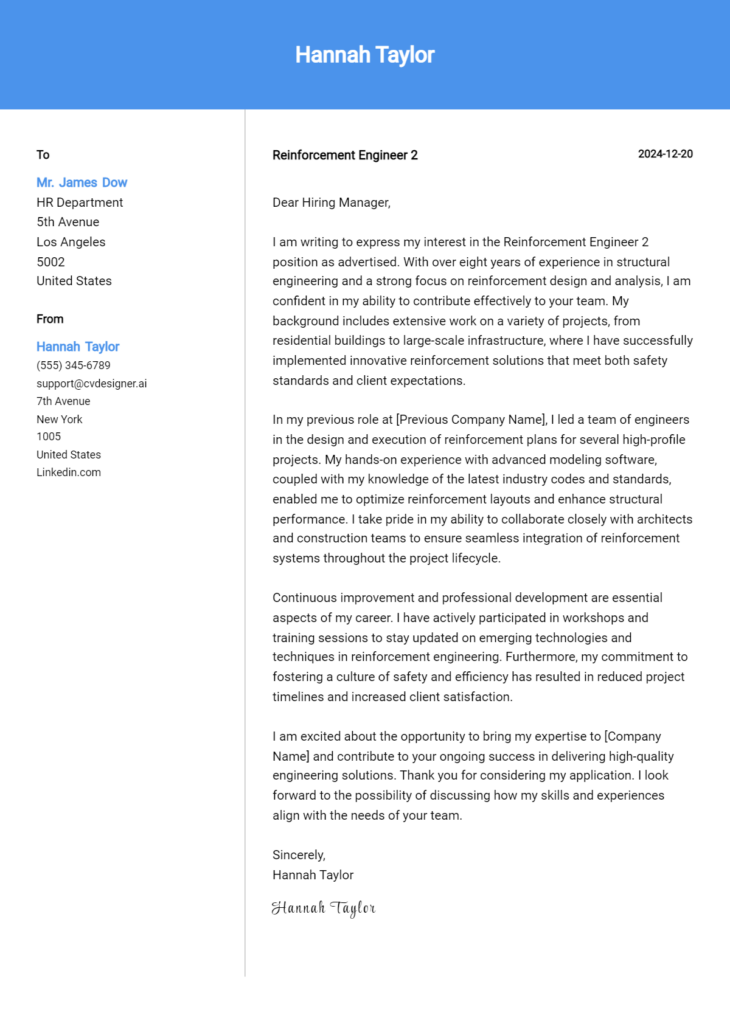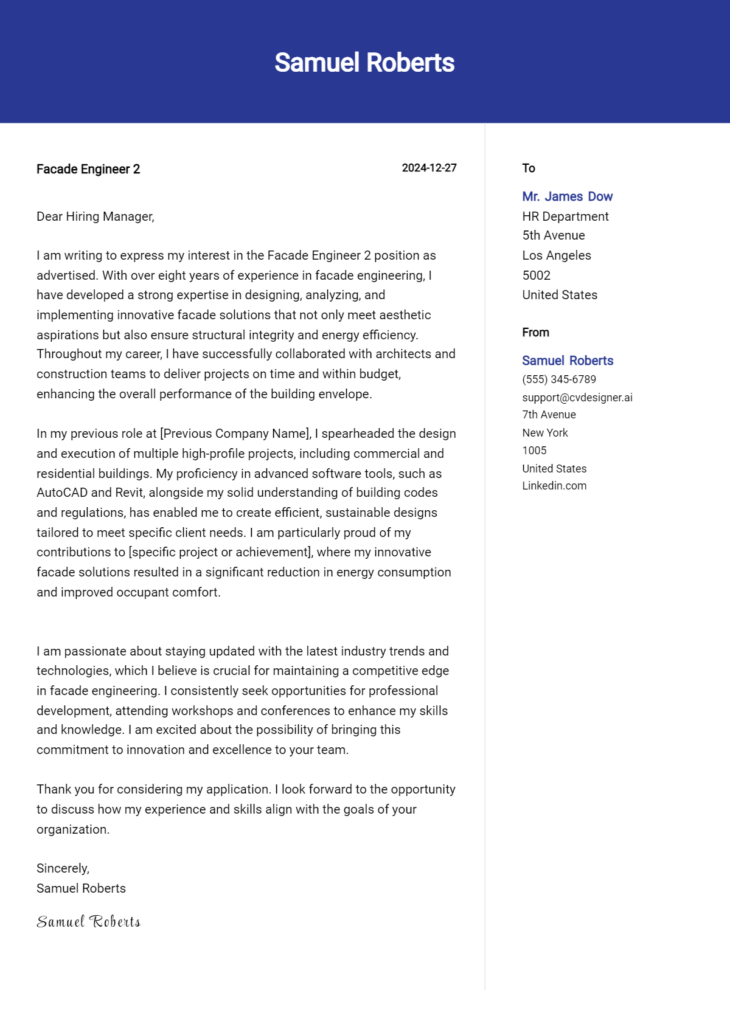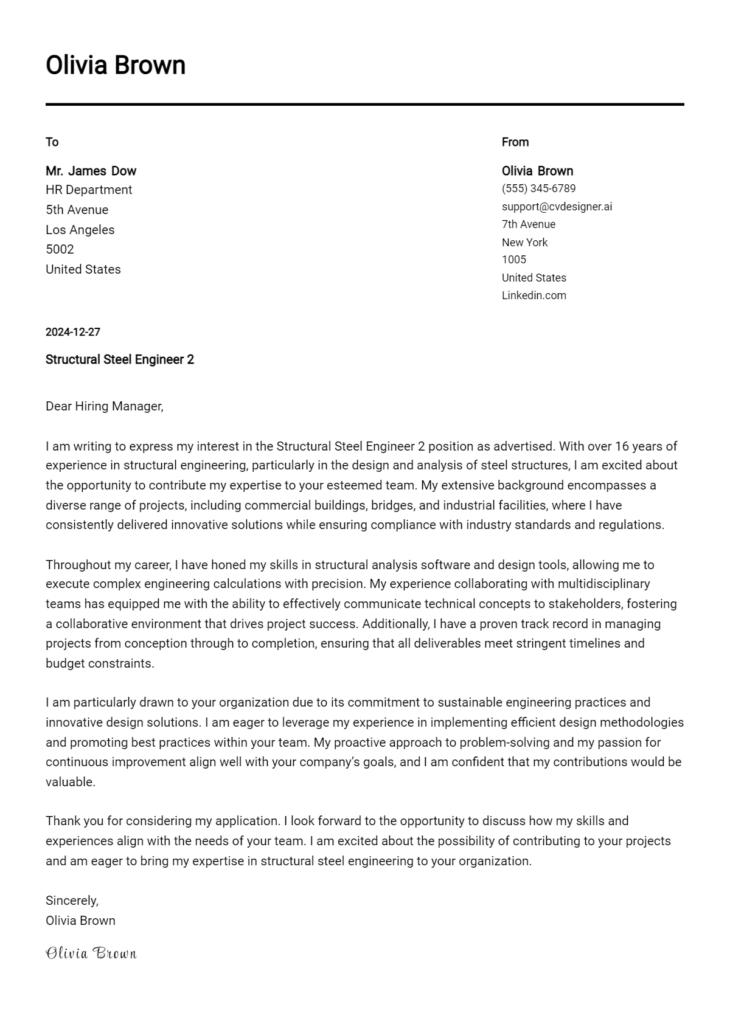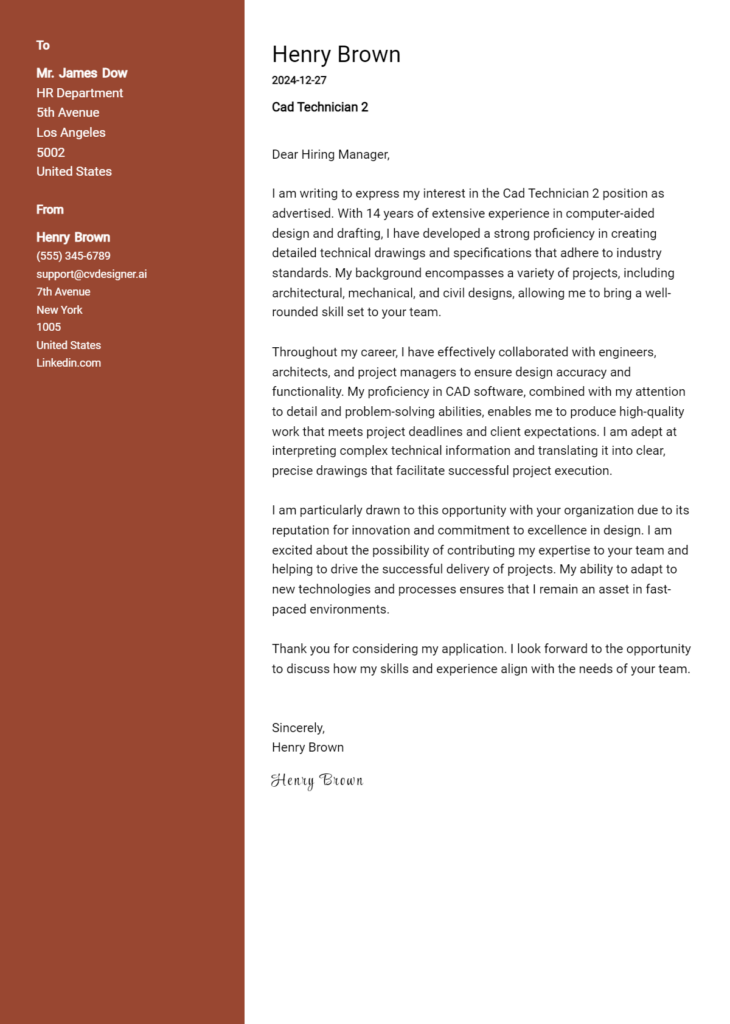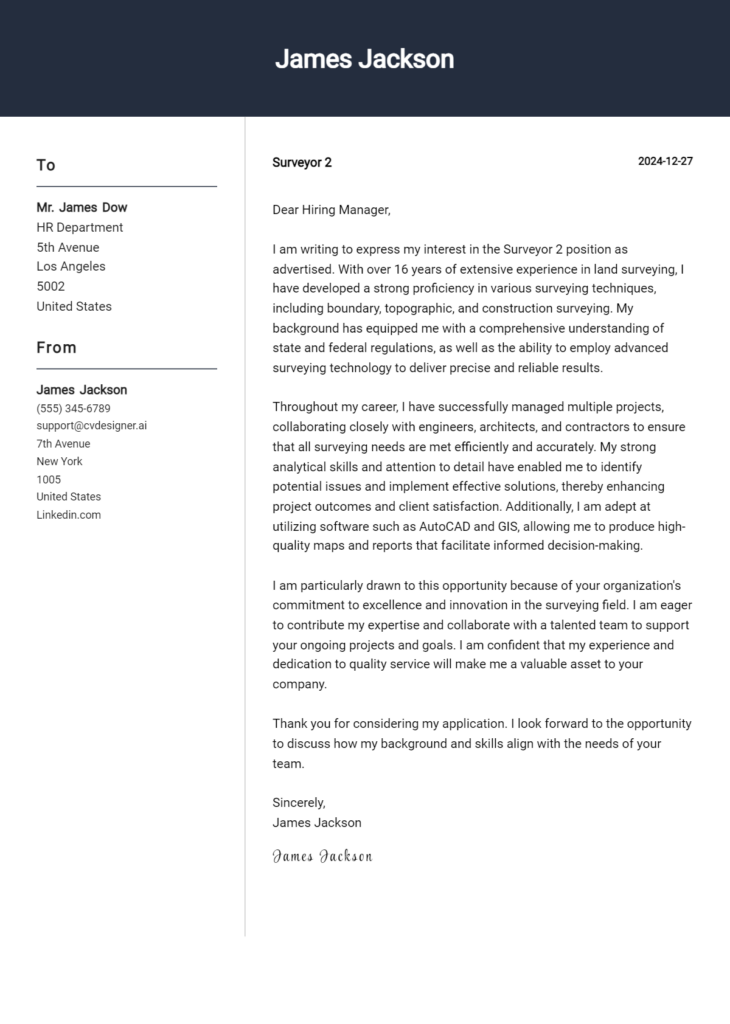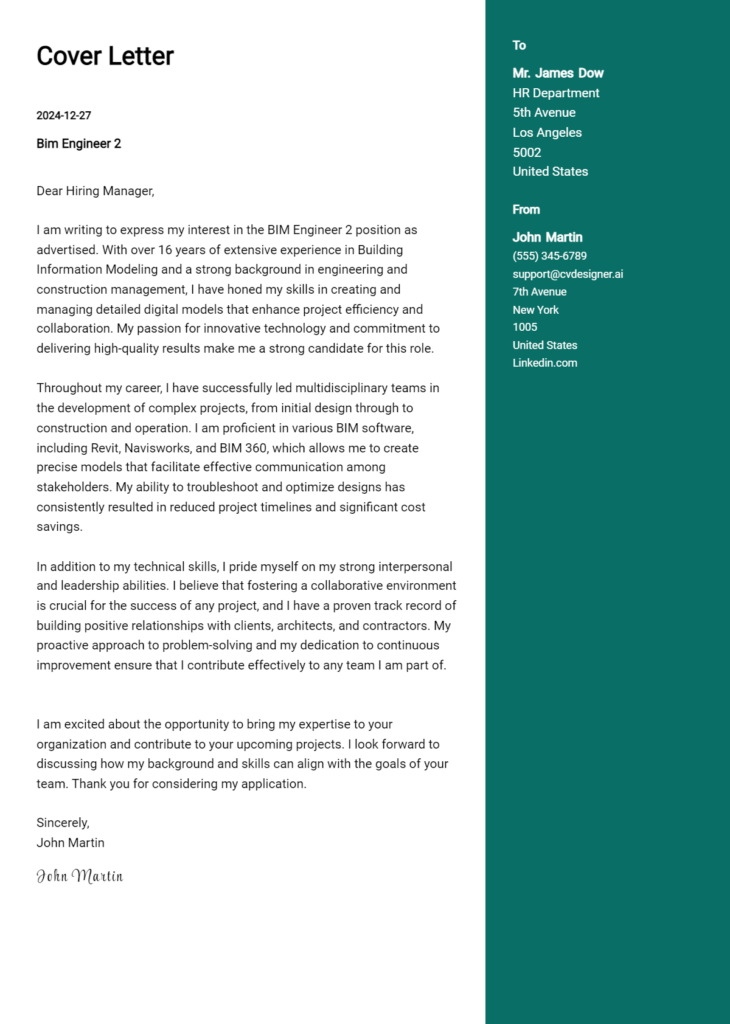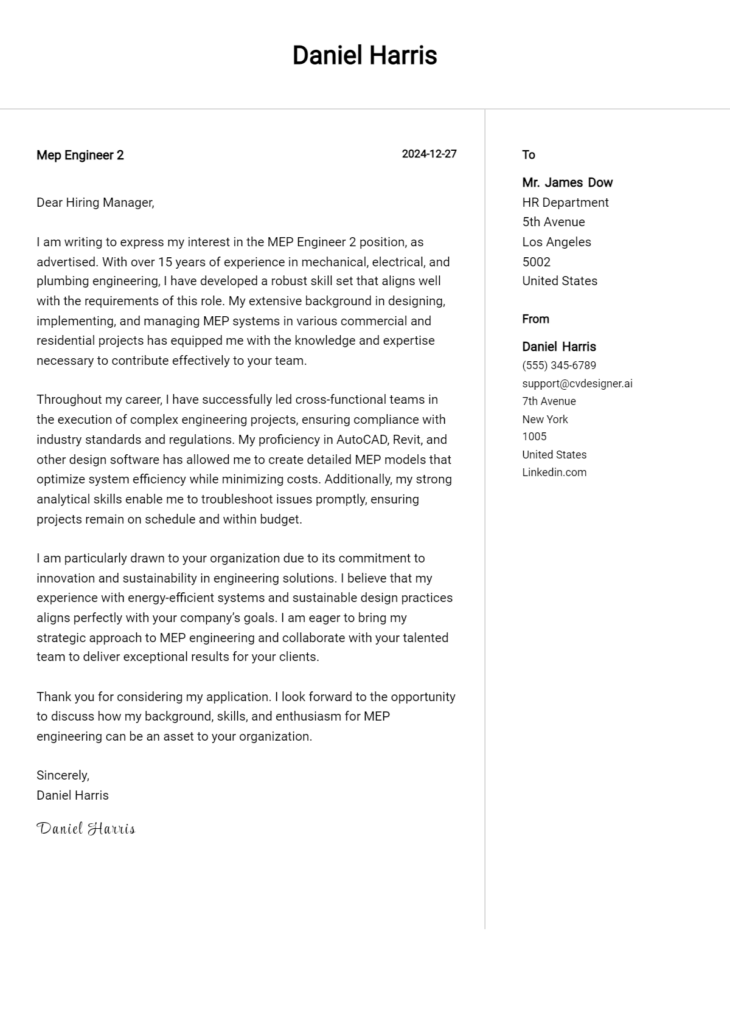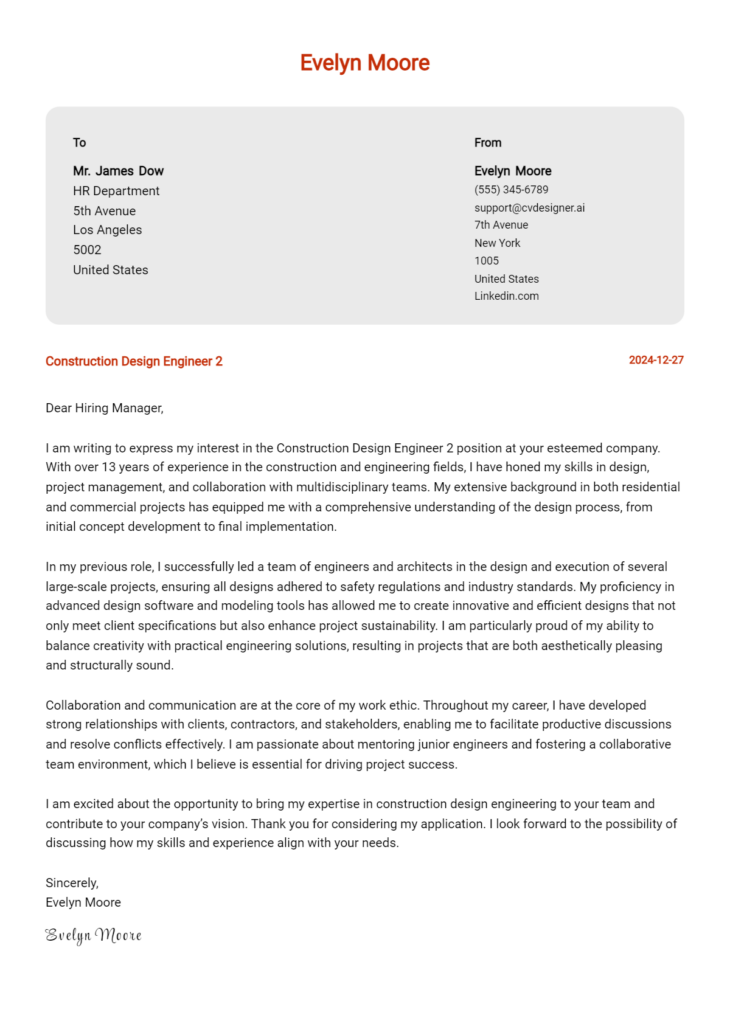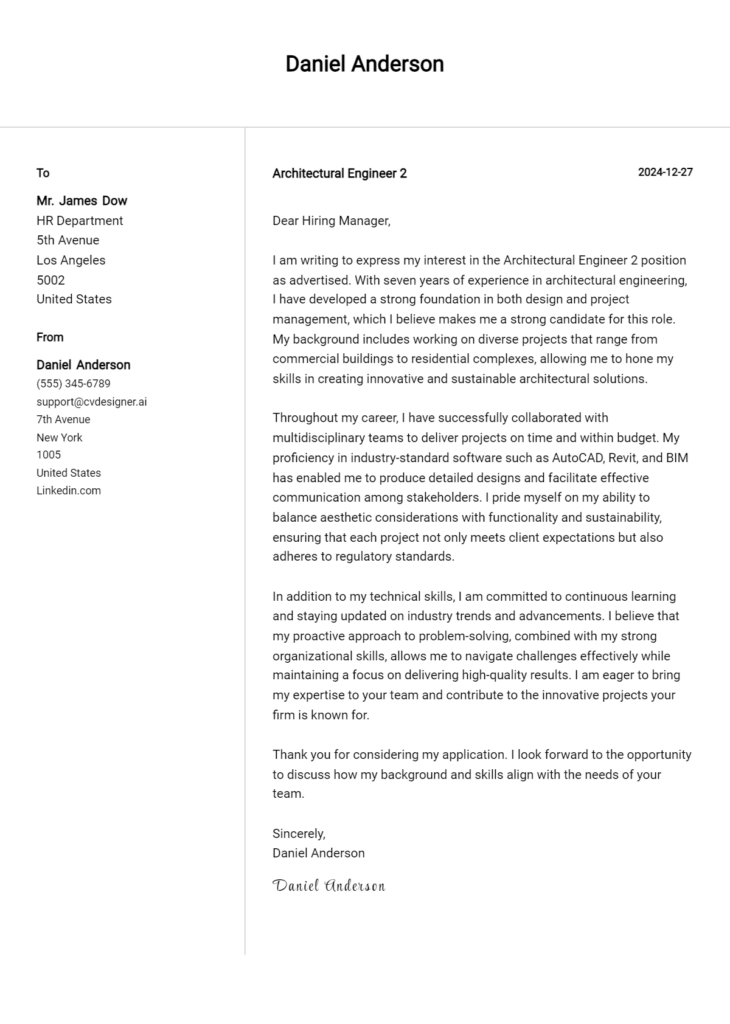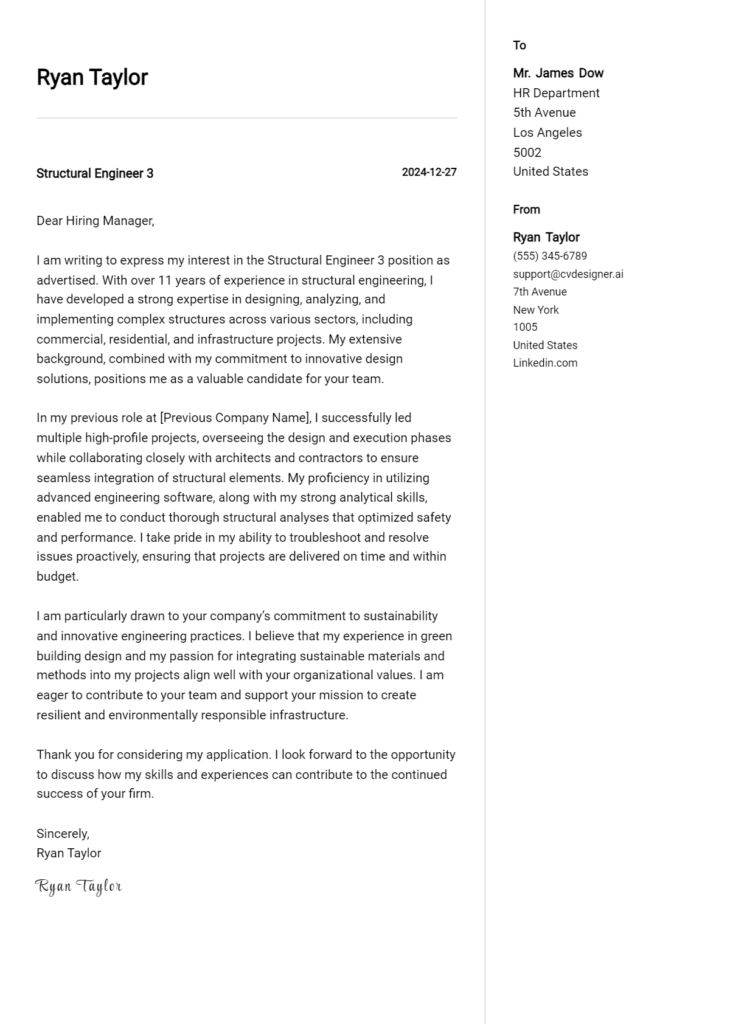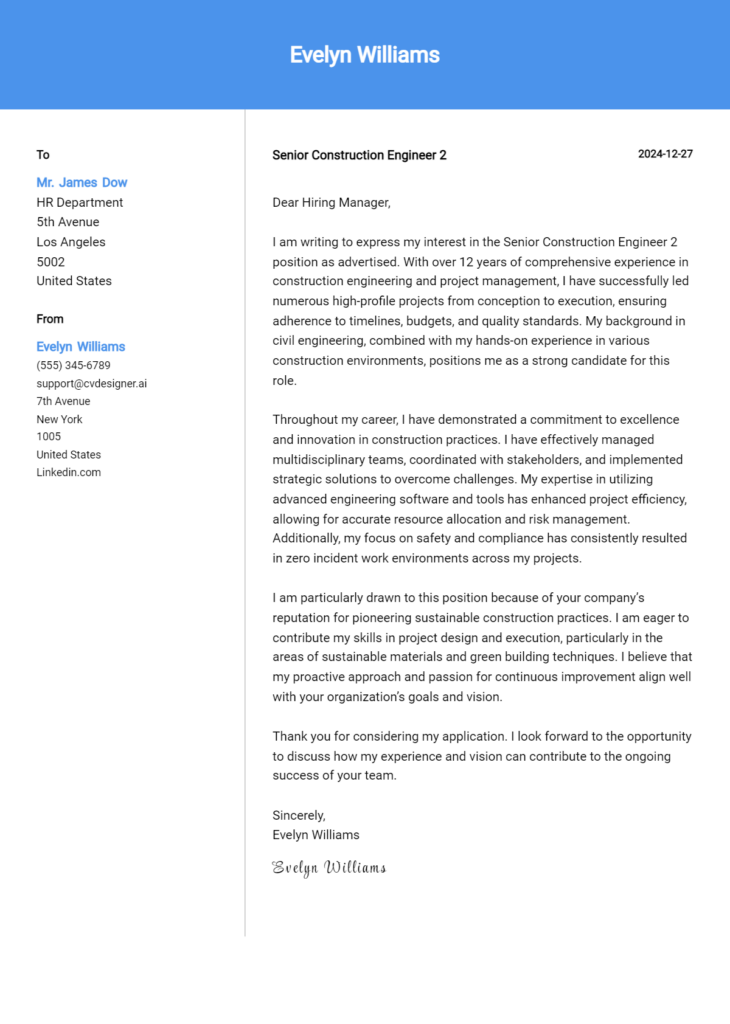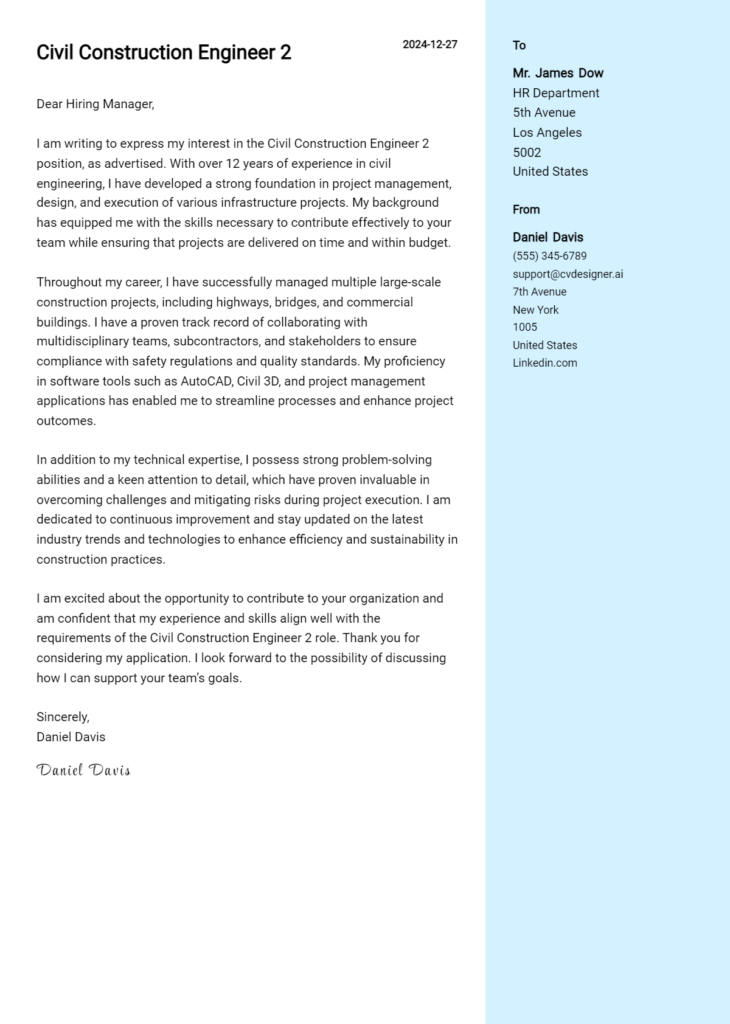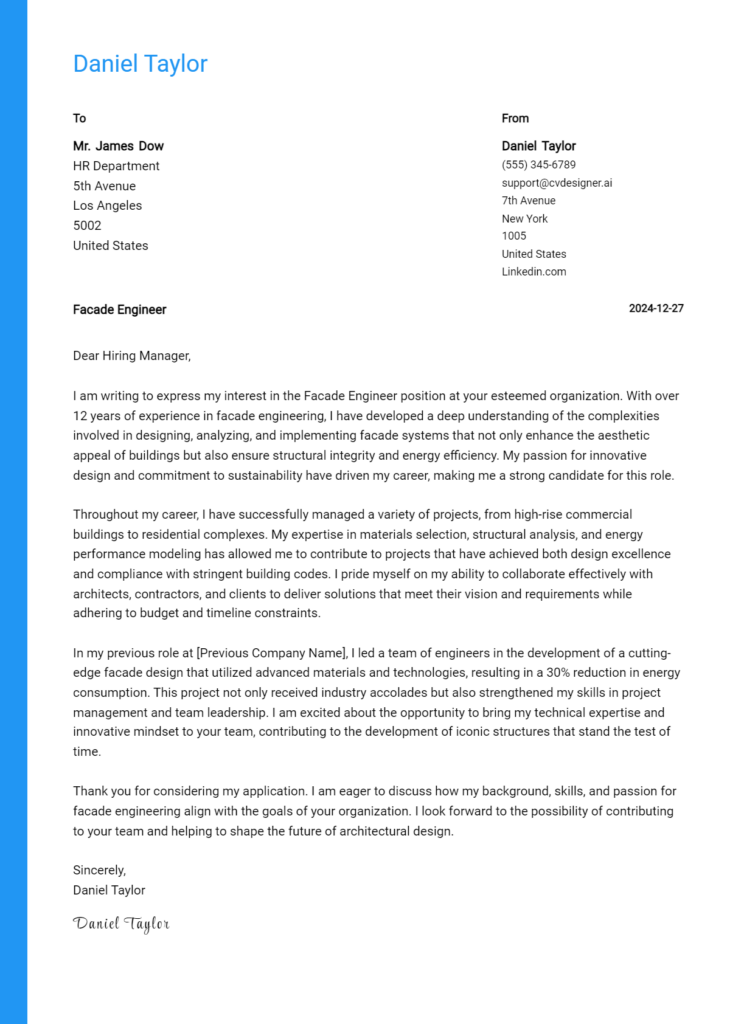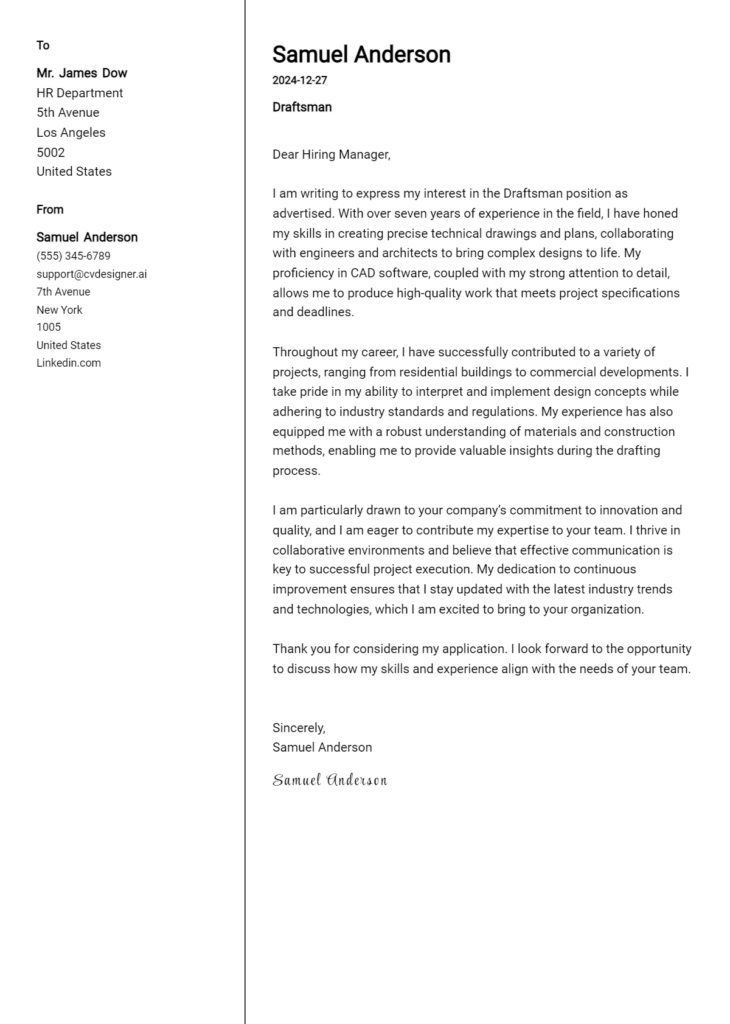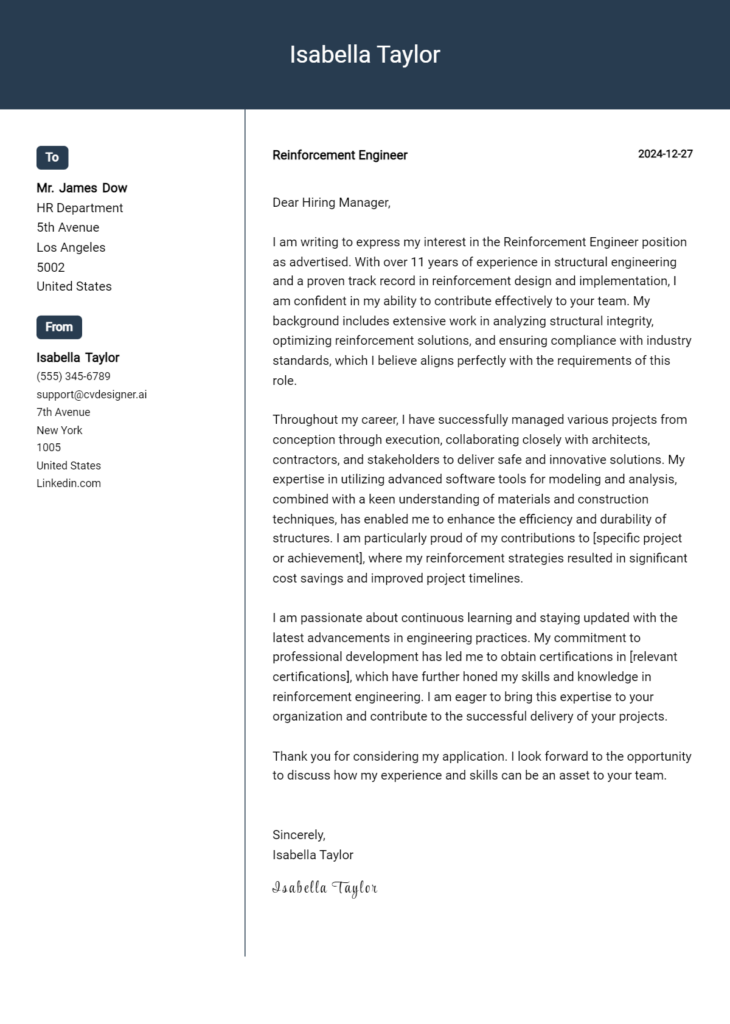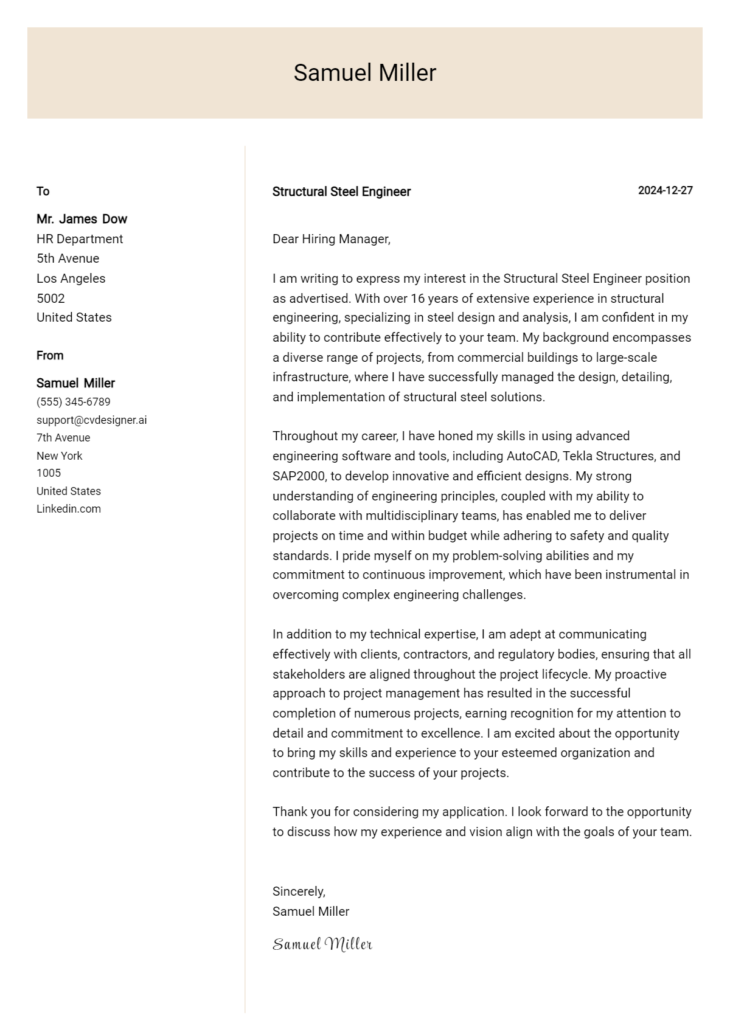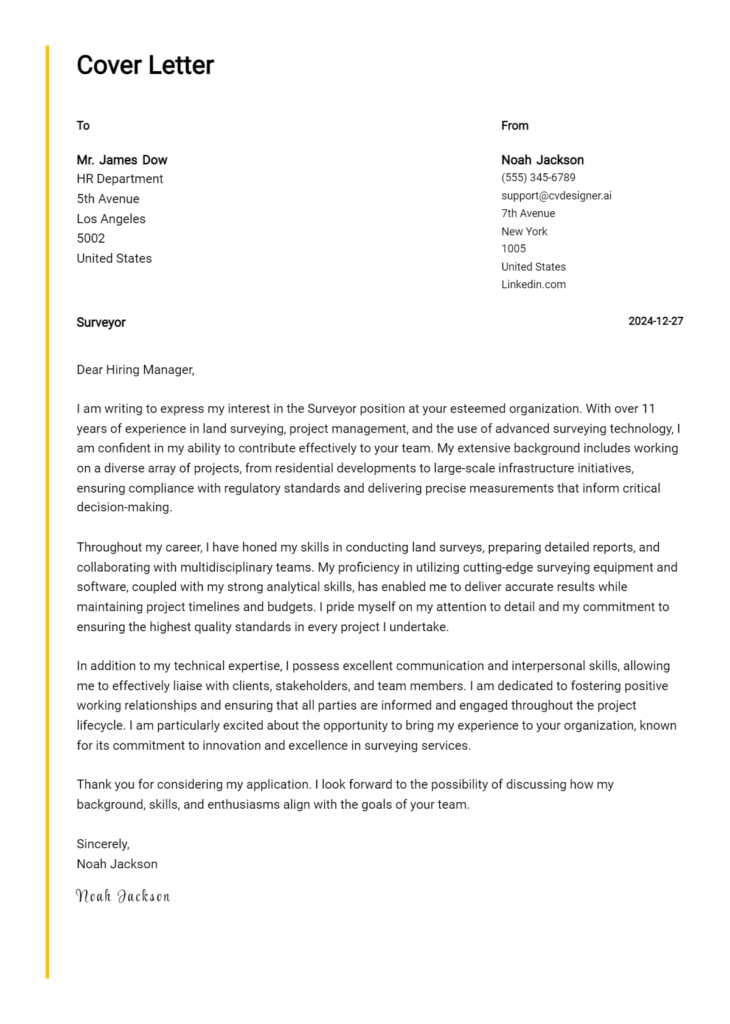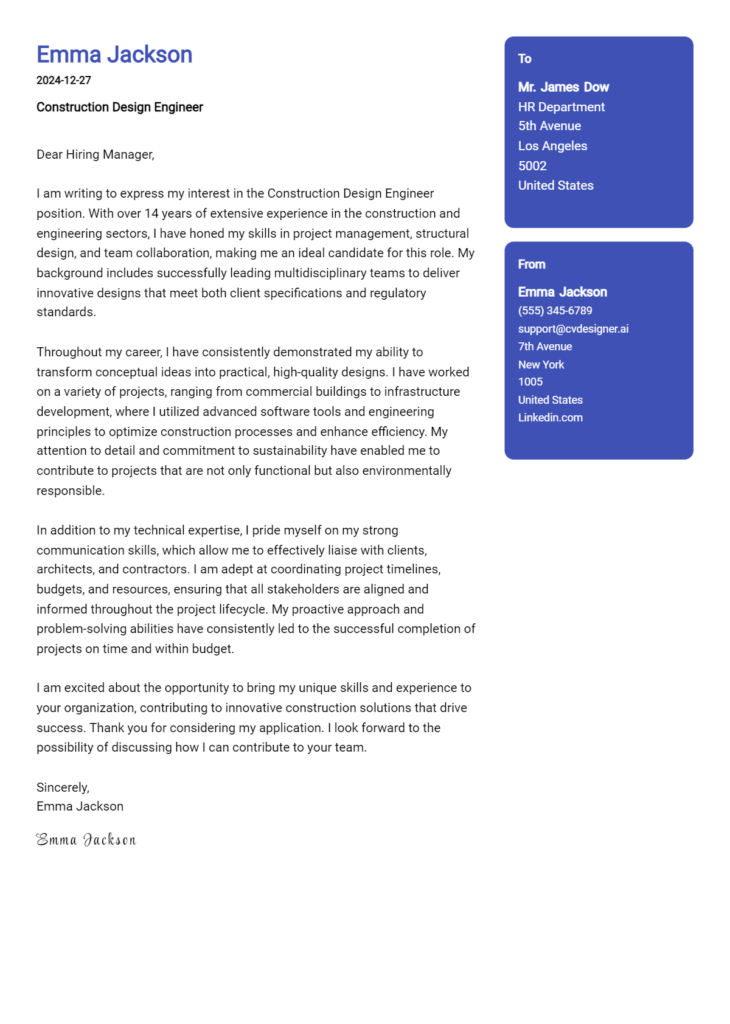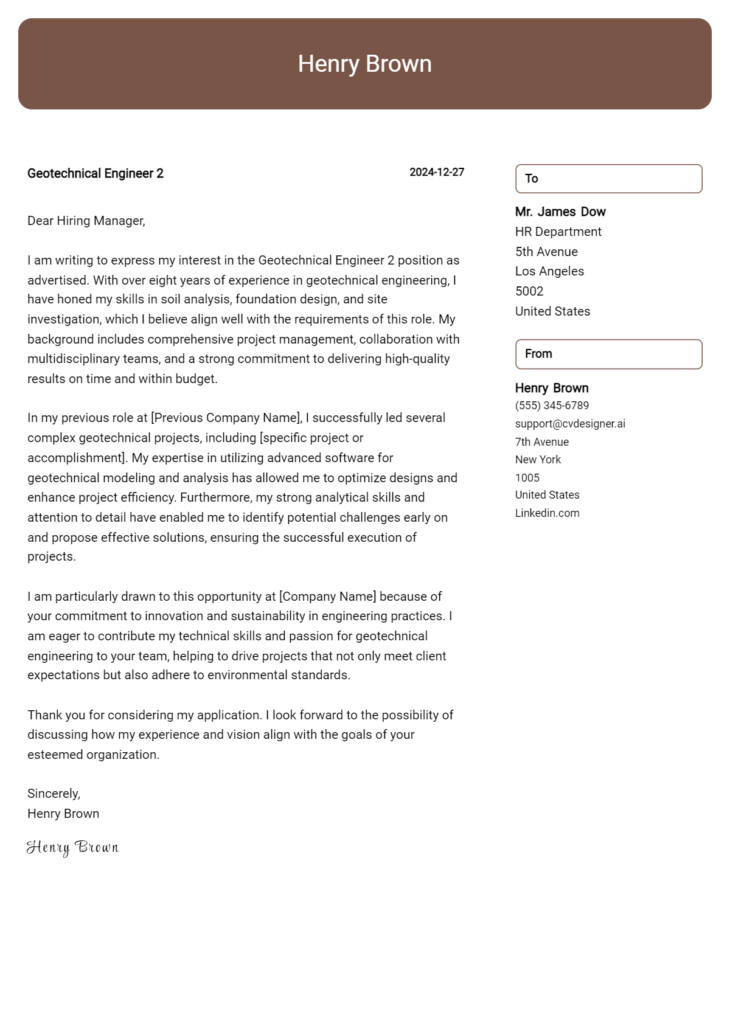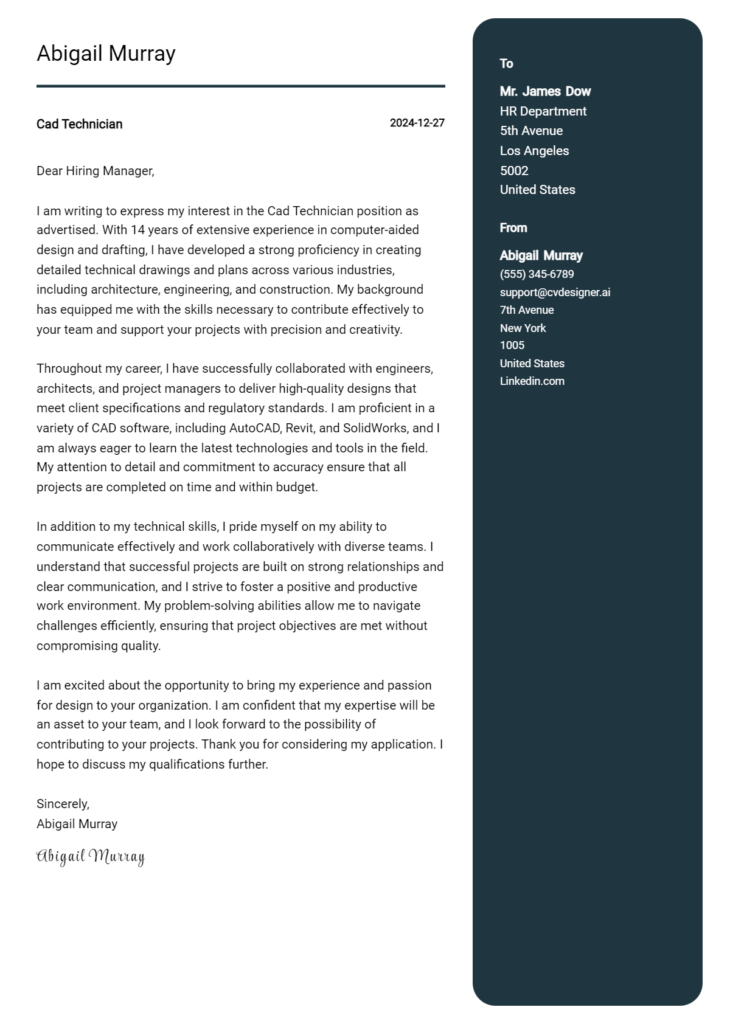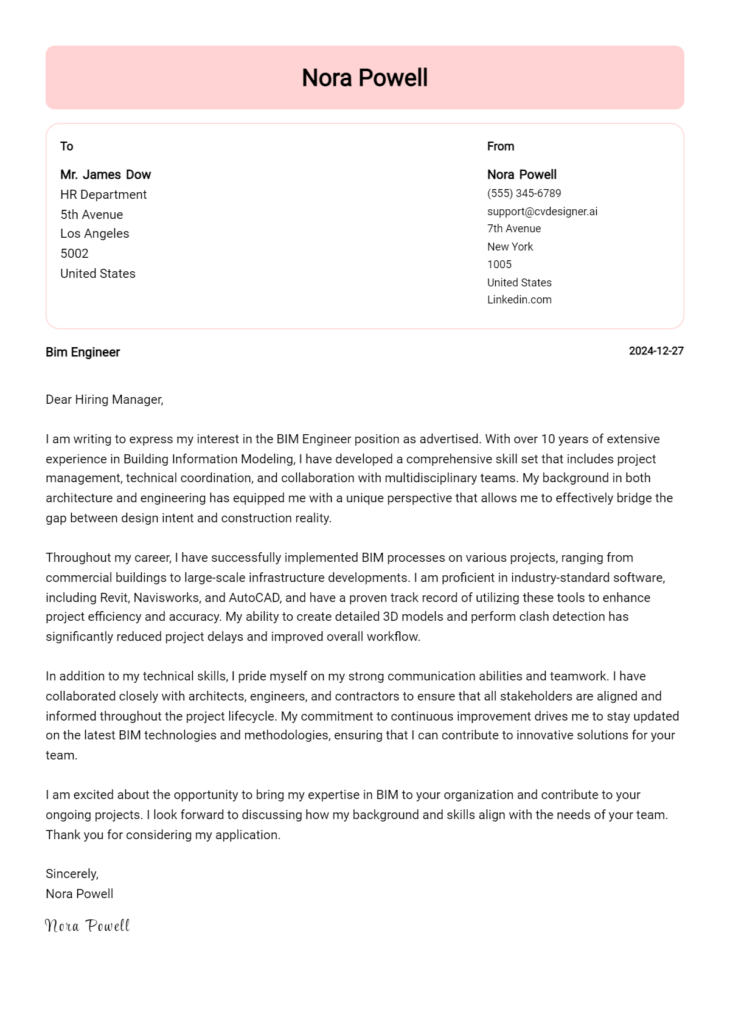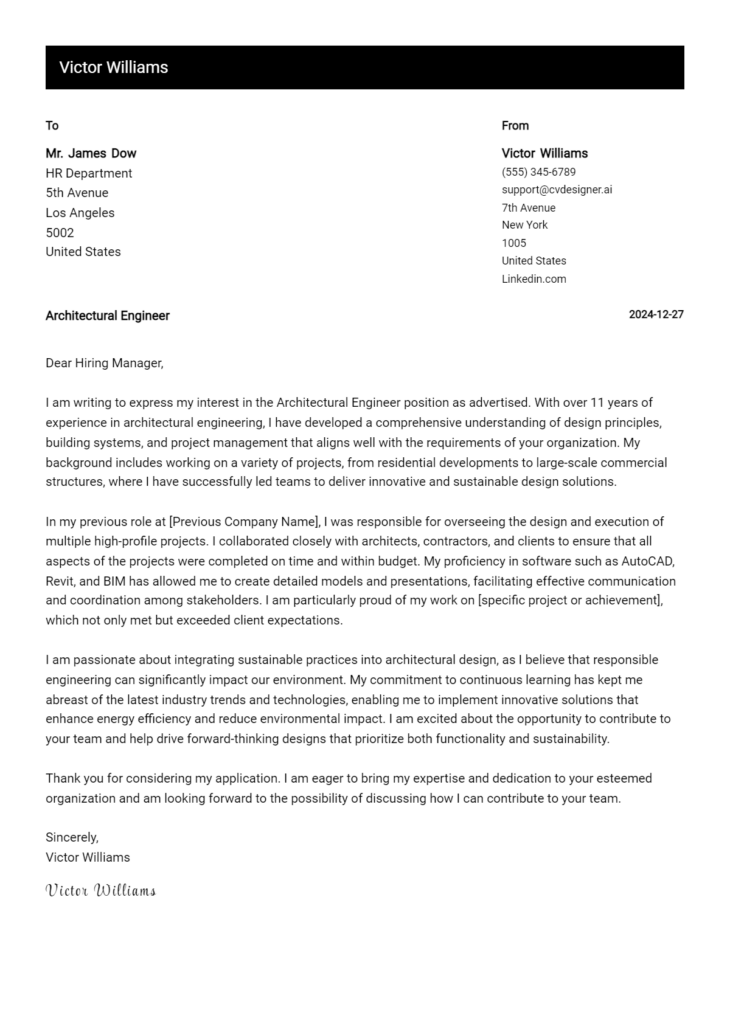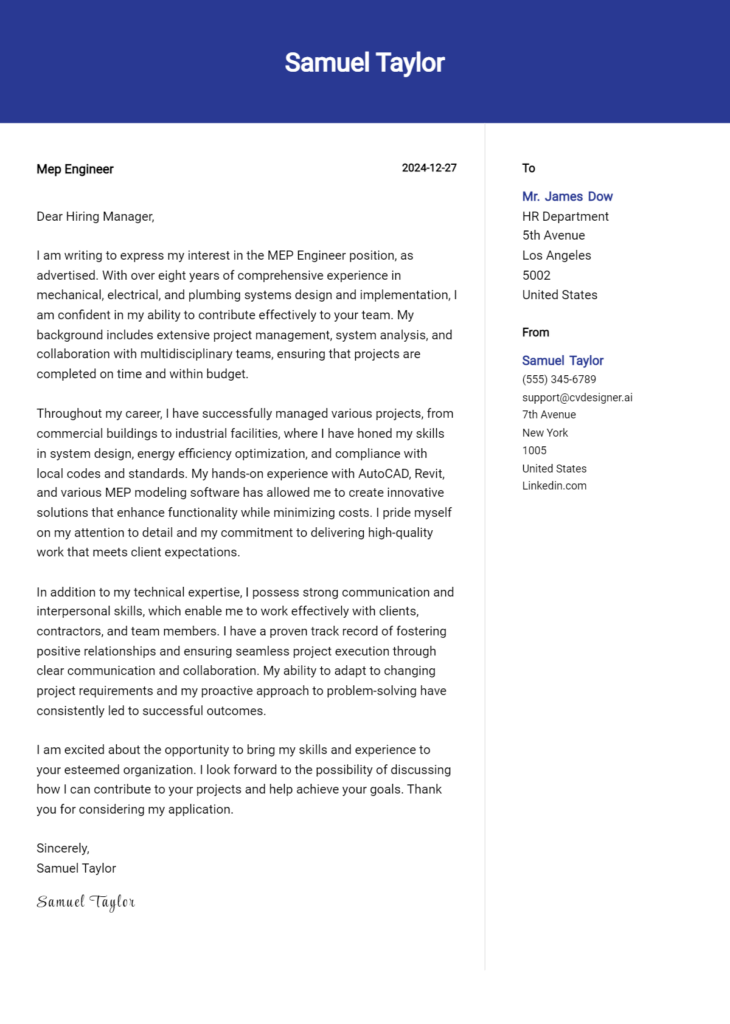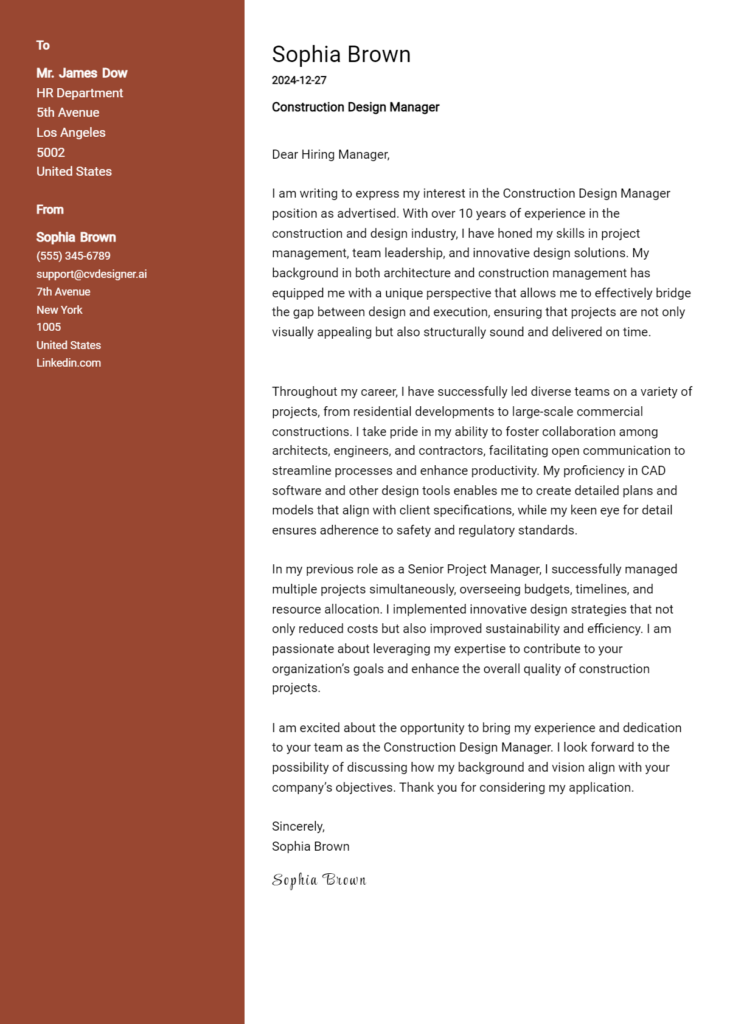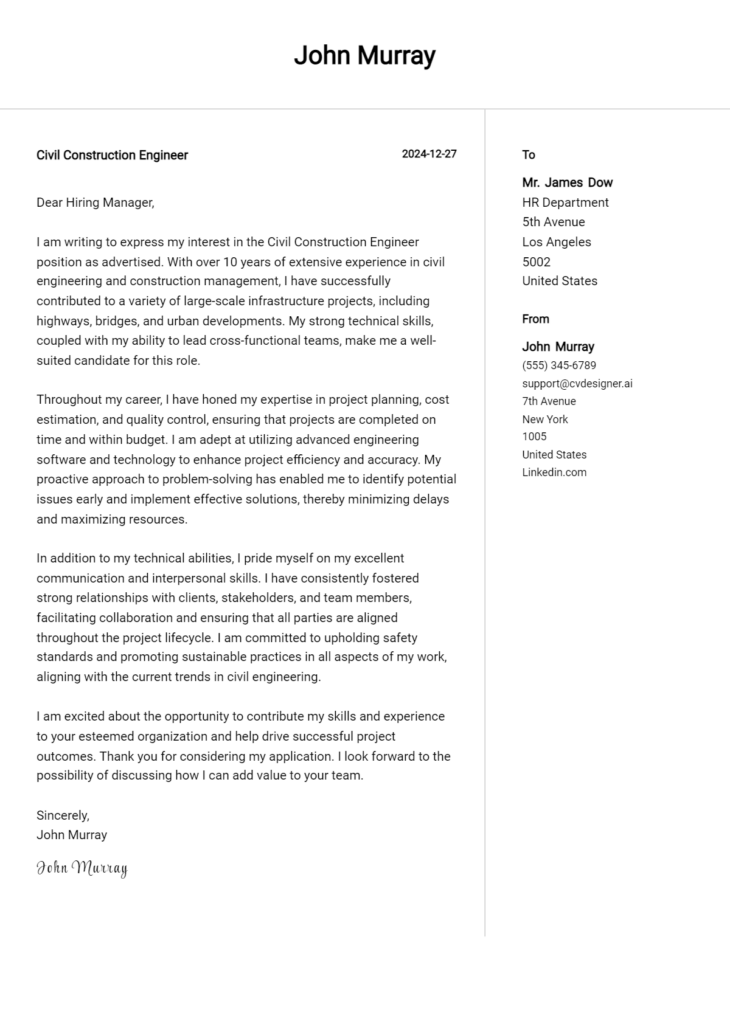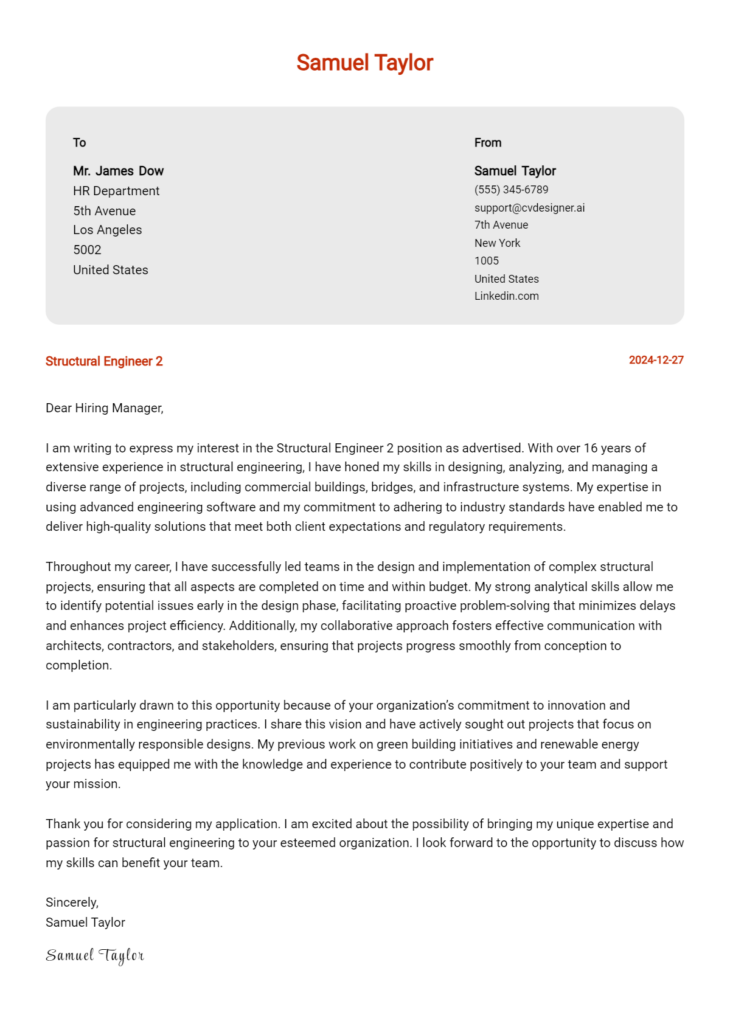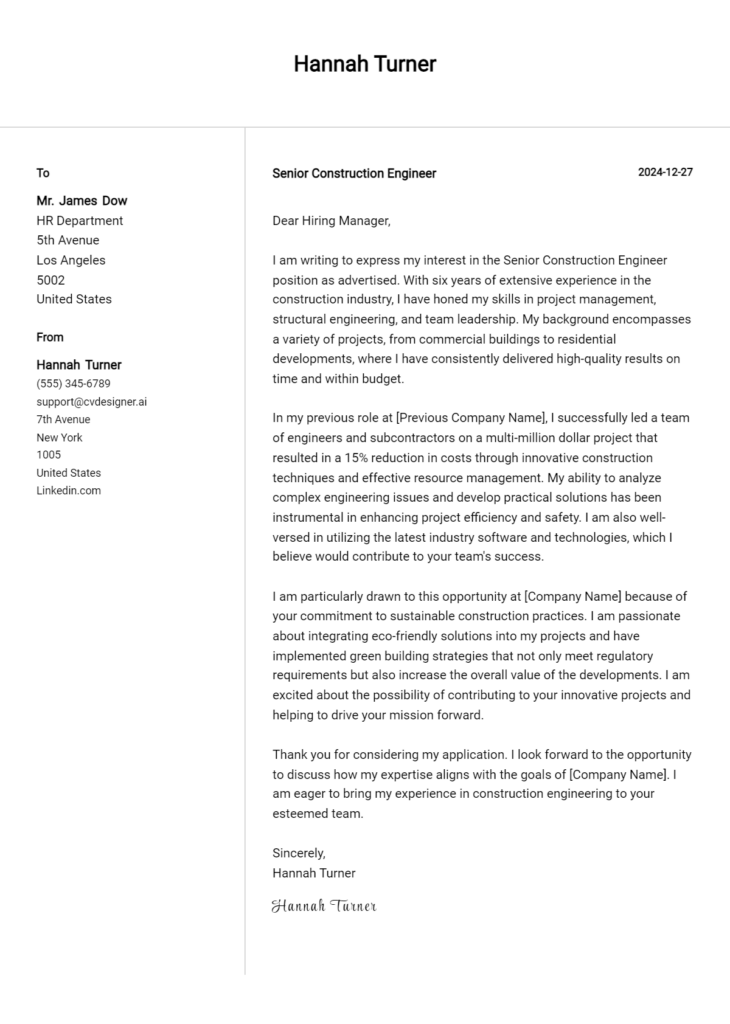Geotechnical Engineer 3 Cover Letter Examples
Explore additional Geotechnical Engineer 3 cover letter samples and guides and see what works for your level of experience or role.
How to Format a Geotechnical Engineer Cover Letter?
Crafting an effective cover letter is crucial for a Geotechnical Engineer, as it serves as your first opportunity to showcase your technical abilities and analytical skills to potential employers. The format of your cover letter not only reflects your professionalism but also highlights your attention to detail—qualities that are essential in geotechnical engineering projects. A well-structured cover letter can capture the hiring manager's interest, providing a clear narrative of your qualifications and experiences relevant to the role.
In this guide, we will explore how to structure your cover letter, offering insights and geotechnical engineering-specific examples to help you create a standout document.
We'll focus on the essential components of a professional cover letter, including:
- Cover Letter Header
- Cover Letter Greeting
- Cover Letter Introduction
- Cover Letter Body
- Cover Letter Closing
Each section plays a vital role in emphasizing your qualifications and dedication to the field. Let’s break down each part and explain how to make your geotechnical engineer cover letter shine.
The Importance of a Cover Letter Header for a Geotechnical Engineer
A well-crafted cover letter header is crucial for a Geotechnical Engineer, as it sets the tone for the entire document and provides essential information at a glance. The header should include your contact information, the date, and the recipient's details, ensuring clarity and professionalism. A strong header makes it easy for hiring managers to identify the applicant and understand the context of the application. It reflects attention to detail, a quality highly valued in engineering roles. Below are examples of both a strong and weak cover letter header for a Geotechnical Engineer.
Strong Example
John Doe 123 Engineering Lane Cityville, ST 12345 (123) 456-7890 john.doe@email.com October 1, 2023 Hiring Manager XYZ Geotechnical Services 456 Construction Ave Buildtown, ST 67890
Weak Example
John D. Somewhere, USA 10/01/2023 To whom it may concern,
The Importance of a Strong Greeting in Your Cover Letter
The greeting of a cover letter plays a crucial role in establishing the tone for the entire document. A well-crafted greeting demonstrates professionalism and sets a positive first impression, signifying to the hiring manager that you are serious about the position. By addressing the hiring manager directly, you also create a sense of personalization, making your application stand out amid a sea of generic submissions. To enhance your greeting, it’s advisable to avoid clichés like "To Whom It May Concern" and instead invest time in researching the recipient's name, which can often be found on the company’s website or LinkedIn. This small effort can significantly elevate your application.
Strong Greeting Example
Dear Dr. Jane Smith,
Weak Greeting Example
To Whom It May Concern,
The Importance of a Strong Cover Letter Introduction for a Geotechnical Engineer
A well-crafted cover letter introduction is crucial for any job application, particularly for a Geotechnical Engineer where specialized skills and technical expertise are paramount. This introduction serves as the first impression for the hiring manager, making it essential to capture their attention immediately. It should not only express the candidate’s enthusiasm for the role but also succinctly highlight key skills or achievements that align with the position. A compelling opening can set the tone for the rest of the cover letter, showcasing the candidate’s qualifications and making a strong case for why they should be considered for the position.
Strong Example
Dear Hiring Manager, As a dedicated Geotechnical Engineer with over five years of experience in analyzing soil mechanics and foundation design, I am excited to apply for the position at [Company Name]. My recent project involving the successful stabilization of a challenging slope in a high-traffic area not only enhanced my technical skills but also reinforced my passion for innovative geotechnical solutions. I am eager to bring my expertise in geotechnical analysis and project management to your esteemed team.
Weak Example
To whom it may concern, I am writing to apply for the Geotechnical Engineer position. I have a degree in civil engineering and some experience in the field. I think I would be a good fit for the job.
Purpose of the Cover Letter Body for a Geotechnical Engineer
The cover letter body for a Geotechnical Engineer serves as a critical component in demonstrating the candidate's technical expertise, relevant experiences, and the unique value they can bring to a potential employer. By detailing specific projects or accomplishments, the applicant can effectively illustrate their problem-solving abilities, understanding of geotechnical principles, and successful collaboration with interdisciplinary teams. This section allows candidates to connect their past experiences with the needs of the company, showcasing how their skills align with the organization's goals and projects.
Strong Example
I am excited to apply for the Geotechnical Engineer position at ABC Engineering. In my previous role at XYZ Consultants, I led a project that involved the geotechnical investigation for a major highway expansion. My team and I conducted extensive soil sampling and analysis, which ultimately contributed to the design of a more stable and cost-effective foundation. Additionally, I collaborated closely with civil engineers to ensure that all geotechnical recommendations were seamlessly integrated into the overall project plan. This experience not only honed my technical skills but also reinforced my ability to communicate complex geotechnical concepts to non-technical stakeholders, thereby enhancing project efficiency and stakeholder satisfaction.
Weak Example
I want to apply for the Geotechnical Engineer job. I have worked on some projects in the past, and I know about soil testing. I think I can do the job well. I hope to use my skills at your company. Thank you for considering my application.
Importance of the Cover Letter Closing for a Geotechnical Engineer
The closing of a cover letter is a critical component, especially for a Geotechnical Engineer. It serves to summarize your qualifications, express your enthusiasm for the role, and prompt the hiring manager to take the next steps, such as reviewing your resume or scheduling an interview. A strong closing leaves a lasting impression and reinforces your suitability for the position, while a weak closing may undermine the impactful points made earlier in the letter.
Strong Example
Thank you for considering my application for the Geotechnical Engineer position at [Company Name]. With my comprehensive background in soil mechanics and foundation design, coupled with my passion for innovative geotechnical solutions, I am excited about the opportunity to contribute to your team. I look forward to discussing how my experience can benefit your projects further. Please feel free to contact me to schedule an interview or if you need any additional information. Thank you once again for your time and consideration.
Weak Example
I hope you like my resume and consider me for the job. I’m kind of interested in working at your company. Let me know if you want to talk more about it.
Crafting an effective cover letter for a Geotechnical Engineer position is crucial for making a strong first impression on potential employers. This document serves as an opportunity to showcase your technical skills, problem-solving abilities, understanding of the Software Development Life Cycle (SDLC), teamwork experience, and a genuine passion for continuous learning. Below are some tips to help you create a compelling cover letter that highlights your qualifications and aligns with the expectations of hiring managers in the geotechnical field.
Tips for Writing a Geotechnical Engineer Cover Letter
Highlight Technical Expertise
Make sure to detail your technical skills relevant to geotechnical engineering, such as soil mechanics, site investigation techniques, and foundation design principles. Use specific examples from your previous work or academic projects to demonstrate your proficiency in these areas. This will not only establish your credibility but also show your potential contribution to the team.Emphasize Problem-Solving Skills
Geotechnical engineers often face complex challenges that require innovative solutions. In your cover letter, describe a specific problem you encountered in a past project and explain how you approached it. Highlight the outcome and what you learned from the experience. This will showcase your analytical thinking and ability to resolve issues effectively.Showcase Knowledge of the SDLC
If applicable, mention any experience you have with the Software Development Life Cycle (SDLC), especially if you have worked on projects that required software tools for analysis or design. Explain how your understanding of the SDLC can enhance project outcomes and improve collaboration among team members. This demonstrates your versatility and adaptability in applying engineering principles.Illustrate Teamwork Experience
Collaboration is key in the field of geotechnical engineering. Use your cover letter to provide examples of successful teamwork experiences. Discuss any roles you played in multidisciplinary teams, how you contributed to group objectives, and the importance of communication in achieving project goals. This will help potential employers see you as a team player.Express Your Passion for Continuous Learning
The field of geotechnical engineering is constantly evolving. Show your commitment to professional development by mentioning any courses, certifications, or workshops you have completed or are planning to pursue. Highlighting your enthusiasm for staying current with industry trends will indicate that you are proactive and eager to grow within the field.
By utilizing these tips, you can effectively communicate your qualifications and make a lasting impression on prospective employers. For additional resources, consider exploring cover letter templates or using a cover letter builder to help streamline the writing process. Good luck with your application!
Common Mistakes to Avoid in a Geotechnical Engineer Cover Letter
Crafting a compelling cover letter is essential for making a positive first impression as a Geotechnical Engineer. Avoiding common mistakes can significantly enhance your chances of standing out to potential employers. Here are some pitfalls to steer clear of:
- Generic Greeting: Using “To Whom It May Concern” can make your letter seem impersonal. Research the hiring manager's name and address them directly.
- Lack of Specificity: Failing to tailor your letter to the specific job can lead to a missed opportunity. Reference specific projects or skills that align with the job description.
- Overly Technical Language: While technical skills are crucial, using too much jargon can alienate non-technical readers. Aim for clarity and accessibility.
- Neglecting Formatting: An unorganized cover letter can detract from your qualifications. Follow a clear cover letter format to ensure readability.
- Repetition of the Resume: Your cover letter should complement your resume, not repeat it. Highlight unique experiences and insights that showcase your suitability for the role.
- Ignoring Proofreading: Spelling and grammatical errors can undermine your professionalism. Always proofread your letter or use tools to check for mistakes.
- Failure to Express Enthusiasm: A lack of passion for the role can come across as disinterest. Convey your excitement for the position and the company to engage the reader.
By avoiding these common mistakes and crafting a thoughtful cover letter, you can significantly improve your chances of landing an interview. For inspiration, check out some cover letter examples that can guide your writing process.
Cover Letter FAQs for Geotechnical Engineer
What should I include in my cover letter as a Geotechnical Engineer?
In your cover letter, you should include your relevant educational background, such as a degree in civil or geotechnical engineering. Highlight specific experiences that demonstrate your technical skills, such as soil analysis, foundation design, or site investigation. Include any certifications, such as Professional Engineer (PE) status, which adds credibility. It’s also important to mention your familiarity with industry software, such as PLAXIS or GeoStudio, and your ability to work in multidisciplinary teams. Finally, explain your passion for geotechnical engineering and how your goals align with the company's projects and mission.
How can I demonstrate my technical expertise in the cover letter?
To demonstrate your technical expertise in your cover letter, use specific examples from your previous work. For instance, describe a complex project where you analyzed soil properties or conducted stability assessments. Include metrics or outcomes that showcase your contributions, like improving project efficiency or reducing costs. Discuss any innovative solutions you implemented, such as using advanced modeling techniques or sustainable materials. Additionally, reference any fieldwork experiences that provided you with practical insights into geotechnical practices. This concrete evidence will establish your credibility and expertise in the field.
Should I tailor my cover letter for each job application?
Yes, you should tailor your cover letter for each job application. Customizing your cover letter demonstrates your genuine interest in the specific position and company, while also allowing you to highlight your most relevant experiences. Research the company and its projects, and mention how your skills align with their needs. For example, if the job emphasizes foundation design for large structures, focus on your experience in that area. Tailoring your cover letter also allows you to address any specific qualifications or requirements listed in the job description, making your application more compelling to potential employers.
How long should my cover letter be?
Your cover letter should ideally be one page long, consisting of three to four paragraphs. Aim for a concise and focused approach, typically around 250 to 400 words. Start with a strong introduction that captures the hiring manager's attention and clearly states the position you are applying for. In the body, elaborate on your relevant experiences and skills, connecting them to the job requirements. Conclude with a strong closing statement that expresses your enthusiasm for the role and your desire for an interview. A well-structured and succinct cover letter will make a positive impression while respecting the hiring manager's time.
Build your Cover Letter in minutes
Use an AI-powered cover letter builder and have your letter done in 5 minutes. Just select your template and our software will guide you through the process.

